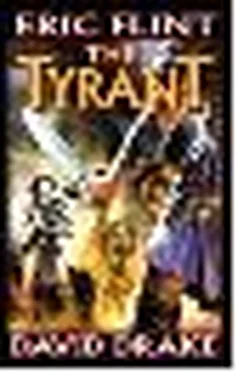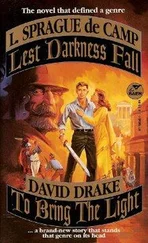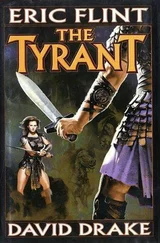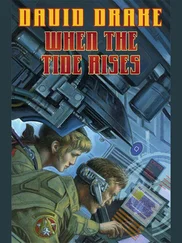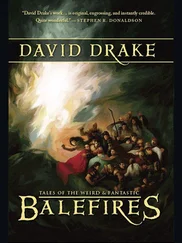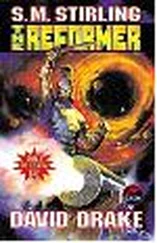David Drake - Tyrant
Здесь есть возможность читать онлайн «David Drake - Tyrant» весь текст электронной книги совершенно бесплатно (целиком полную версию без сокращений). В некоторых случаях можно слушать аудио, скачать через торрент в формате fb2 и присутствует краткое содержание. Жанр: Боевая фантастика, на английском языке. Описание произведения, (предисловие) а так же отзывы посетителей доступны на портале библиотеки ЛибКат.
- Название:Tyrant
- Автор:
- Жанр:
- Год:неизвестен
- ISBN:нет данных
- Рейтинг книги:5 / 5. Голосов: 1
-
Избранное:Добавить в избранное
- Отзывы:
-
Ваша оценка:
- 100
- 1
- 2
- 3
- 4
- 5
Tyrant: краткое содержание, описание и аннотация
Предлагаем к чтению аннотацию, описание, краткое содержание или предисловие (зависит от того, что написал сам автор книги «Tyrant»). Если вы не нашли необходимую информацию о книге — напишите в комментариях, мы постараемся отыскать её.
Tyrant — читать онлайн бесплатно полную книгу (весь текст) целиком
Ниже представлен текст книги, разбитый по страницам. Система сохранения места последней прочитанной страницы, позволяет с удобством читать онлайн бесплатно книгу «Tyrant», без необходимости каждый раз заново искать на чём Вы остановились. Поставьте закладку, и сможете в любой момент перейти на страницу, на которой закончили чтение.
Интервал:
Закладка:
The oldest of the officers, a trim gray-haired man named Kirn Thatcher, smiled faintly and gave a nod of his head toward the youngest.
"My vote's for Ulrich, then. He's Haggen gentry. They're an incorruptible lot of yokels, not like us decadent Vanberts proper."
That was Ulrich Bratten, whose coarse black hair and dark complexion indicated his heritage. He came from Hagga, the Confederacy's auxiliary nation in the far northeastern peninsula of the continent. Like the Roper League, Hagga retained the formal trappings of being an "independent realm," even if in practice it was simply a vassal of the Confederacy. It was not unusual at all for Haggens and Ropers to ignore the fiction altogether and simply enlist directly in the Vanbert army.
Bratten frowned. "Not sure that's such a good idea. The Emeralds have never been too fond of us Haggens. The gods know how many wars we fought with the bastards before Vanbert stifled the lot of us." He sounded vaguely distressed by the latter, as if the big and vigorous-looking young general officer regretted the passing of those lost days when Haggen and Emerald phalanxes clashed almost annually on the open plains between the two neighboring countries.
"I don't care about that ," stated Demansk. "I'm not trying to cater to the Emeralds, just keep them contented." He ignored Thatcher's little snort of derision. It wasn't aimed at him, and he tended to share Thatcher's skepticism concerning the likelihood that the notoriously fractious Emeralds would ever be "content" about much of anything. "As long as the province is governed fairly and firmly, with no more tax-gouging and other illegal levies, that'll be good enough."
"I agree," added the third of the officers. That was Robret Crann. In age somewhere between Thatcher and Bratten, he was much heavier built than the other two general officers. He gave Thatcher a somewhat reproving glance. "I've been here longer than either Kirn or Ulrich. Personally, I've always found Emeralds easy enough to get along with. Sure, they use three words when one would do, and it always takes them an hour to get to the point. But they're not that impractical, when you get right down to it."
The look of reproof segued into a sly smile. "As any commander who's been swindled by an Emerald supplies provisioner can testify."
That brought a little laugh into the room from everyone, even though Thatcher's face was half-scowling. The famous metaphysical penchant of Emeralds did not extend to their merchants, who were stone-cold empiricists to a man.
Demansk planted his hands on his knees and straightened up on his couch. "Ulrich?"
The young officer hesitated for not more than a second. "I'll do it. Even though—" His young face, every line and angle of which practically exuded vigor , was not that of a happy man.
Demansk chuckled. "Relax, son. I'll be very surprised if the Island campaign is the last chance you'll ever have to prove your mettle in the field. Besides, you've already done that anyway — it's the reason you're the youngest brigade commander since. . well, since me. And you didn't have my family connections. That promotion was won on the field, and well deserved."
He rose, took a few steps, and clapped Bratten on the shoulder. "The truth is, the experience will be good for you. You know it as well as I do."
After a moment, Ulrich nodded. Although the rank he held was, in military terms, that of a general commanding a brigade, the formal Vanbert term for it was actually magistrate in arms. Above the level of battalion commander — whose rank was either "battlemaster" or simply "battalion," depending on whether the man who held the command was promoted from the ranks or received his appointment directly from the Council — the Confederacy of Vanbert drew no sharp lines between military and civil posts. Depending on the circumstances of the moment, a Vanbert leader was expected to be able to exercise competent authority in any field of political or martial endeavor.
Ulrich Bratten was one of the rare cases of a man who had risen to high command exclusively through his military ability. A fact which was explained, of course, by his ancestry. The "Confederacy" of Vanbert was theoretically a realm of equal nations, with no distinction made between the original twelve tribes and the various auxiliary nations which had been accreted to it over the centuries. The practical reality was different. With few exceptions, membership in the Council was reserved for those noblemen who could trace their ancestry back to the "First Twelve."
Of course, in the modern Confederacy, "tracing their ancestry" was a lot more complicated than it had been in former times. Here as in so many ways, Emerald philosophy and rhetoric had shaped the culture of their conquerors. The distinction between Being and Becoming had been the first to fall, once Emerald dialecticians got their hands on it.
"You'll need to hire a genealogist," murmured Robret Crann. The sly smile was back on his pudgy face. "I can recommend a very good one, by the way."
Ulrich scowled. Crann and Thatcher both enjoyed teasing the young general about his lowly origins. In Thatcher's case, the teasing had at least a solid basis. Thatcher, like Demansk, came from one of the Confederacy's long-established elite families.
Crann's claim to "noble Twelve blood," on the other hand, was stretched about as thinly as the tunic over his potbelly. If it hadn't been for his undoubted military skills, the claim would probably never have been accepted at all by the Council's Registrar, despite the size of the bribe. Everything about Robret Crann, from his penchant for gourmandizing down to his heavy accent, practically shrieked: peasant from the east! parvenu! lowly soldier risen above his station!
But. . however grudgingly, the Registrar had not challenged the claim. Vanbert was practical, if nothing else. Officers like Crann were almost invariably popular with the soldiers, and nobody really wanted to irritate the army. Marcomann's dictatorship had been occasioned, among other things, by the festering resentment among his troops at the continuing prejudice against the poor easterners who filled most of its lower ranks.
"That's settled, then," said Demansk. He glanced at the hourglass on a small table in the corner of the room. "And it's time. Let's do it."
* * *
Demansk probably wouldn't have had any trouble himself smashing down Willech's door. But, since he had the largest soldier in Crann's regiment assigned to the task, he let him do it. The six-and-a-half-foot-tall giant, with the weight of full armor added to his own, went through the door like so much wet paper. He didn't even seem to break stride.
The other eight men in the squad followed on his heels, pouring into the Governor's luxurious suite like greatbeasts stampeding into a mansion. Demansk heard Willech shout something incoherent, heard a cough and a sigh, another shout — more like a shriek — from Willech, and then came into the room behind his soldiers. Doing his best to move ponderously, as suited a solemn magistrate about his duty, rather than sauntering gaily. Demansk had known Willech since they were both children romping in the corridors of Vanbert's public buildings. He'd detested the seven-year-old boy; the decades which had elapsed since had done nothing except give adult comprehension to the reasons for the detestation.
The first thing he saw, entering the room, was one of Willech's bodyguards. The regular soldier assigned the duty on a daily basis, this one. Demansk was sorry to see it, though not surprised. The soldier was lying on his back, clutching a spear wound in his belly. Blood was gushing through the fingers and spilling onto the plush red-violet carpeting. That had been the cough and sigh he'd heard.
Читать дальшеИнтервал:
Закладка:
Похожие книги на «Tyrant»
Представляем Вашему вниманию похожие книги на «Tyrant» списком для выбора. Мы отобрали схожую по названию и смыслу литературу в надежде предоставить читателям больше вариантов отыскать новые, интересные, ещё непрочитанные произведения.
Обсуждение, отзывы о книге «Tyrant» и просто собственные мнения читателей. Оставьте ваши комментарии, напишите, что Вы думаете о произведении, его смысле или главных героях. Укажите что конкретно понравилось, а что нет, и почему Вы так считаете.
